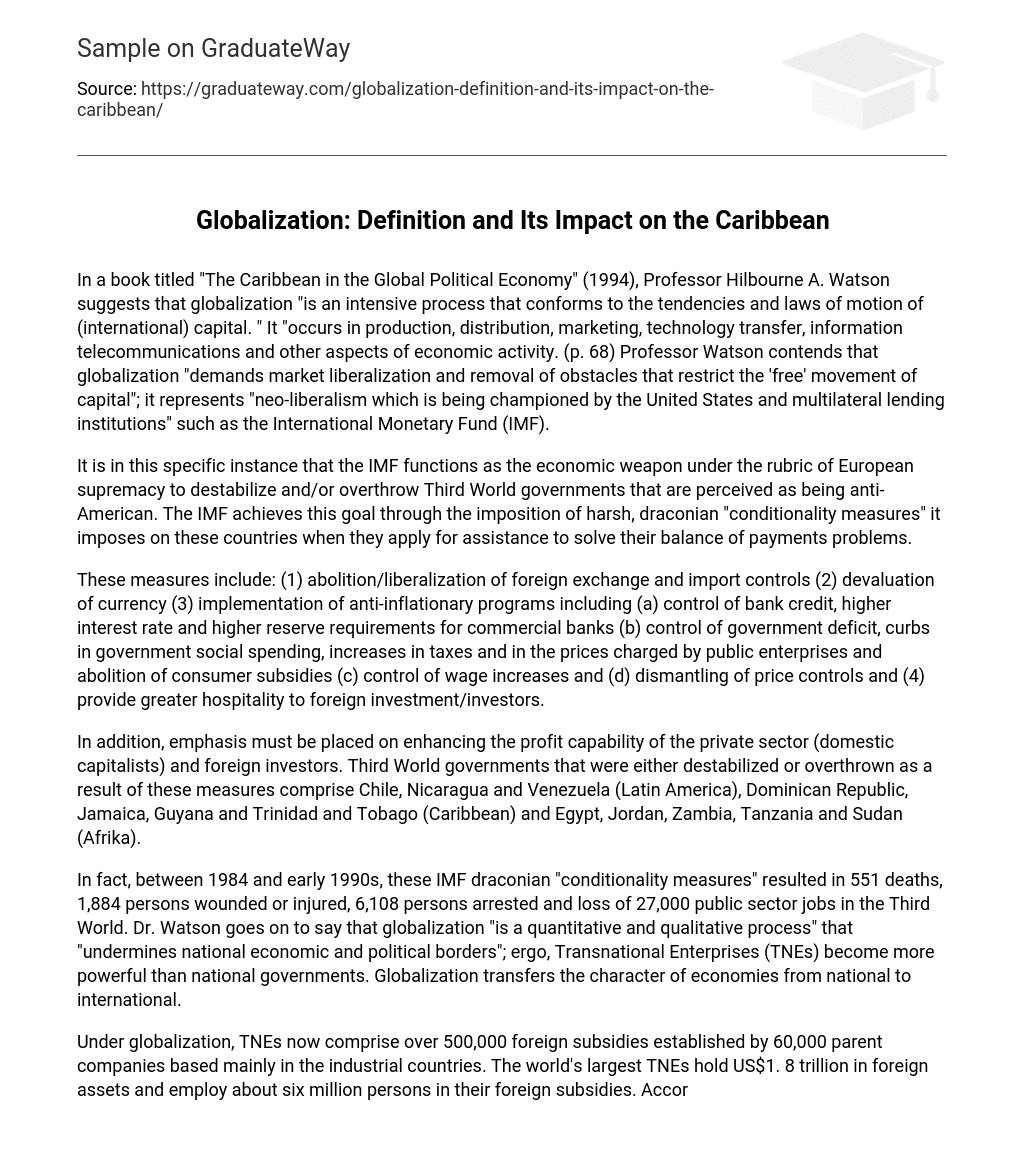According to Professor Hilbourne A. Watson’s 1994 book, “The Caribbean in the Global Political Economy,” globalization is in line with international capital’s tendencies and laws of motion. The professor argues that various economic activities are affected by globalization, including production, distribution, marketing, technology transfer, and information telecommunications (p. 68). He emphasizes the importance of market liberalization and the removal of barriers for capital flow as prerequisites for globalization. Moreover, he views globalization as a form of neo-liberalism promoted by the United States and multilateral lending institutions like the International Monetary Fund (IMF).
Under the guise of European superiority, the IMF functions as an economic instrument to generate instability or overthrow Third World governments seen as anti-American. To tackle their balance of payments challenges, these nations face severe enforcement of repressive “conditionality measures” enforced by the IMF.
These measures encompass: (1) the elimination/relaxation of foreign exchange and import restrictions (2) currency devaluation (3) implementation of anti-inflation programs including (a) regulation of bank credit, increased interest rates, and higher reserve requirements for commercial banks (b) control of government deficits, restrictions on social spending, tax hikes, and increased prices by public enterprises, and elimination of consumer subsidies (c) regulation of wage increases, and (d) removal of price controls and (4) fostering a more welcoming environment for foreign investment/investors.
The adoption of measures designed to enhance the profitability prospects for both local capitalists and foreign investors has resulted in the destabilization or toppling of governments in numerous nations, such as Chile, Nicaragua, Venezuela, Dominican Republic, Jamaica, Guyana, Trinidad and Tobago, Egypt, Jordan, Zambia, Tanzania, and Sudan.
During the period from 1984 to the early 1990s, there were harsh conditions imposed by the IMF in the Third World. These measures had negative consequences such as causing 551 deaths, 1,884 injuries, and leading to 6,108 arrests. Additionally, there was a loss of 27,000 public sector jobs. Dr. Watson expands on this by stating that globalization has the effect of reducing economic and political boundaries among nations. Consequently, Transnational Enterprises (TNEs) gain more power than national governments, resulting in a worldwide shift towards economies that are not centered around individual nations.
Globalization has led to the creation of over 500,000 foreign subsidiaries by 60,000 parent companies, largely from industrialized nations. The biggest Transnational Enterprises (TNEs) in the world have amassed $1.8 trillion in foreign assets and employ approximately six million people through their overseas branches. In a 2005 article titled “Effects of Globalization,” George Dhanny highlighted the increasing consolidation of power within the European Union and its transfer to cross-border commercial banks without democratic oversight. In 2006, the World Bank examined how globalization impacted developing countries and found that the richest fifth of the global population controls about 80% of global income, while the poorest fifth in Third World nations only possess 1% of global income. Moreover, there has been an almost 50% increase since 1980 in individuals living on less than $2 per day, raising significant concerns about globalization’s detrimental effects on impoverished nations.
Globalization has failed to distribute economic gains to Third World countries as liberalization allows them to flow predominantly towards industrial nations. Ultimately, globalization solely benefits the monopoly/international capital and capitalist class. The impact of globalization on the Caribbean region is marked by a re-colonization influenced by Euro-American powers in various ways, such as:
The increase in American fast food outlets has significantly changed the culinary habits of Caribbean people. Popular brands like KFC, White Castle, Subway, Mario’s Pizza, Pizza Boys, Pizza Hut, Burger King, Mc Donald’s, Church’s Chicken, Royal Castle, Ginzanos Sub, Popeye’s Chicken & Sea Food,
Quintanos and others have gained popularity in the region. This shift towards American fast food not only affects eating habits but also contributes to a rise in obesity among young individuals in the Caribbean. Trinidad and Tobago holds the highest obesity rate per capita in the Caribbean. Instead of opting for local cuisine,
Caribbean people now prefer American fast food.
The food import bill in Trinidad and Tobago, amounting to TT$2.2 billion, indicates a perceived reluctance towards local cuisine. Caribbean societal values have experienced a shift, now accepting single-parent families that were previously disregarded and deemed unacceptable. Television habits in this region are significantly influenced by globalization, with over seventy-five percent of TV programs originating from or developed in America. As a result, Caribbean music has been impacted by American genres such as hip hop and rap, leading to the widespread adoption of American fashion and accessories among individuals in the Caribbean. Despite being viewed as insane, negative, and self-destructive behavior, young men in Trinidad and Tobago imitate their African-American counterparts by wearing low pants that expose their underwear.
The dress code commonly seen in African-American prisons has not only influenced the fashion choices of criminals but has also become a popular trend among young African-Trinibagonian men. Furthermore, the government of Trinidad and Tobago aims to transform Port-of-Spain into an industrially developed city resembling Manhattan, Miami, or San Francisco. Ultimately, globalization has resulted in the fragmentation of Caribbean economies, mirroring the regressive trend observed in the United States.





